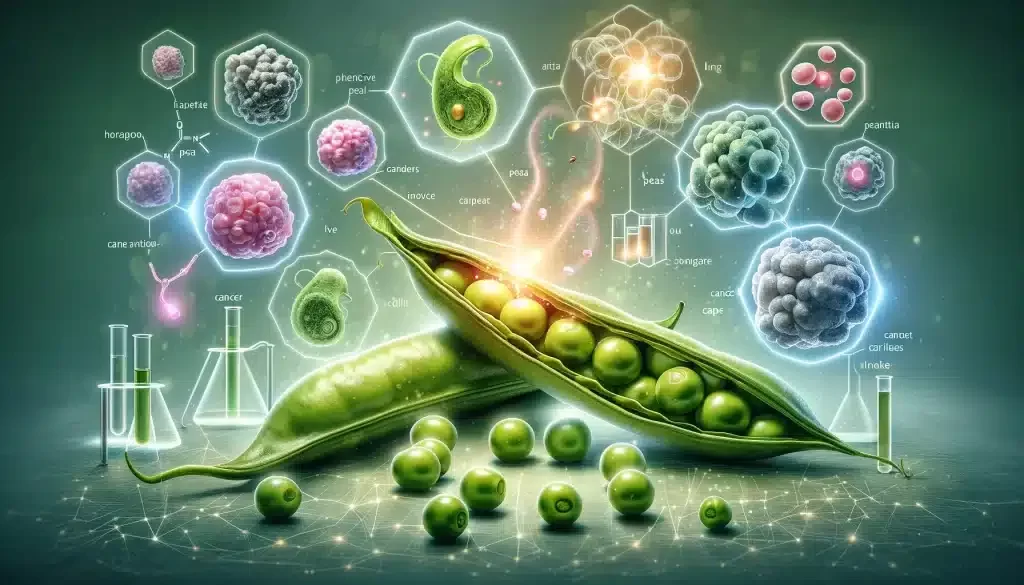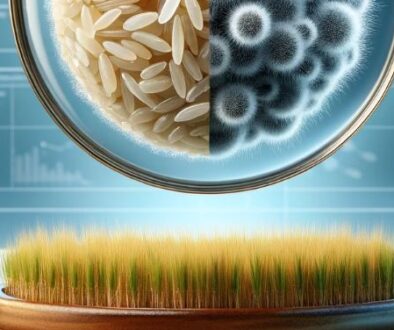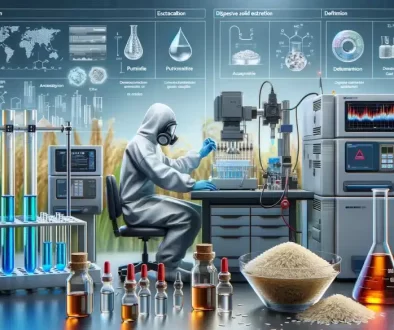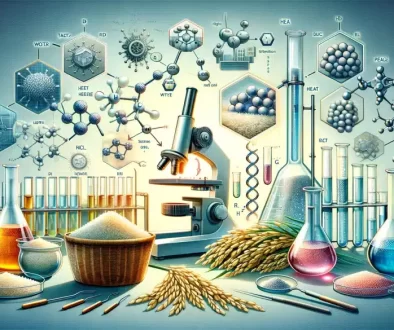Anti-Tumor Activity of Pea Peptides
Explore the groundbreaking study on pea peptides’ antitumor activities against liver, lung, stomach, and breast cancer cells, showcasing promising cancer treatment potentials.
Key words: Pea peptides, Antitumor activity, Enzymatic preparation, Isolation and purification, Structure identification
This study investigates the anti-tumor effects of pea protein hydrolysates, examining how various enzymatic digests influence tumor cell proliferation. Given the global prevalence of liver, lung, stomach, and breast cancers, this research uses cell lines representative of these cancers (HepG2, MCF-7, MGC803, A549) alongside a normal liver cell line (L-02) to assess the efficacy of pea peptides and their potential in cancer treatment.
Antitumor Activity of Different Enzymatic Digests
The study presents the inhibitory effects of pea protein powder (PP), enzymatic hydrolysates APPH, TPPH, and the positive control 5-FU on the growth of four cancer cell lines and one normal liver cell line across various concentrations (0.1, 0.5, 1 mg/mL). Results show that untreated pea protein slightly promotes growth in normal liver cells, highlighting the safety and low toxicity of plant-derived proteins. However, significant differences were observed in the inhibition rates of cancer cells between untreated pea proteins and enzymatically treated peptides, indicating that active peptides are released through enzymatic digestion.
Effects of APPH on Cancer Cell Growth
Graphs illustrate the dose- and time-dependent inhibitory effects of APPH on cancer cells, with increasing concentrations leading to higher inhibition rates. This time and dose dependence is a crucial characteristic of antitumor drugs, suggesting the potential of APPH as a source of antitumor agents.
Separation, Purification, and Identification of Antitumor Peptides from Peas
Impact of Ultrafiltration Fractions on Cell Growth
The study divided APPH into four fractions based on molecular weight through ultrafiltration. Among these, the fraction with peptides below 1 kDa showed the strongest antitumor activity, suggesting that molecular size is a critical factor in antitumor efficacy.
Effects of Dextran Gel Chromatography Fractions on Cell Growth
APPH-IV was further divided into four fractions via dextran gel chromatography, with APPH-IV-2 displaying the highest antitumor activity. This fraction was enriched for further separation and purification steps.
Effects of Reverse-Phase High-Performance Liquid Chromatography Fractions on Cell Growth
Three subfractions from APPH-IV-2 were isolated using RP-HPLC, with APPH-IV-2-3 showing the highest activity. This aligns with the notion that antitumor peptides often possess high hydrophobicity.
LC-ESI-MS/MS Analysis of Active Peptide Structures
The structural identification of active peptides was performed through LC-ESI-MS/MS analysis, identifying potential antitumor peptides based on their abundance, match scores, and structural characteristics indicative of antitumor activity.
Effects of Synthetic Peptides on Cell Growth
Synthetic peptides were tested for their antitumor activity, indicating that the combination of peptides in APPH-IV-2-3 exhibits stronger activity, possibly due to synergistic effects. This suggests further investigation into the mechanism of action is required.
Discussion
The findings demonstrate that enzymatic hydrolysis of pea proteins, particularly using alkaline protease, enhances the antitumor activity of the resulting peptides. The choice of enzyme significantly affects the activity of the peptides produced. The study highlights the importance of peptide size, amino acid composition, and hydrophobicity in their antitumor effectiveness. Peptides containing arginine and proline, as well as other hydrophobic amino acids, may contribute to their antitumor properties, which warrants further exploration of their action mechanisms.
For more further detailed information of this research, feel free to contact our team for asssistance.
Original authors: Pan Fen, Wang Yanping, Mo Zhaohui (Food Engineering, Tianjin University of Science and Technology, Tianjin, 300457)
About ETprotein:
ETprotein, a reputable rice protein Chinese factory manufacturer and supplier, is renowned for producing, stocking, exporting, and delivering the highest quality organic bulk vegan protein and plant proteins. They include Organic rice protein, clear rice protein, pea protein, clear pea protein, pumpkin seed protein, sunflower seed protein, mung bean protein, etc. Our offerings, characterized by a neutral taste, non-GMO, allergen-free attributes, cater to a diverse range of industries. We serve nutraceutical, pharmaceutical, cosmeceutical, veterinary, as well as food and beverage finished product distributors, traders, and manufacturers across Europe, USA, Canada, Australia, Thailand, Japan, Korea, Brazil, and Chile, among others.
Our specialization includes exporting and delivering tailor-made protein powder and finished nutritional supplements. Our extensive product range covers sectors like Food and Beverage, Sports Nutrition, Weight Management, Dietary Supplements, Health and Wellness Products, and Infant Formula, ensuring comprehensive solutions to meet all your protein needs.
As a trusted company by leading global food and beverage brands and Fortune 500 companies, ETprotein reinforces China’s reputation in the global arena. For more information or to sample our products, please contact us and email sales(at)ETprotein.com today.












